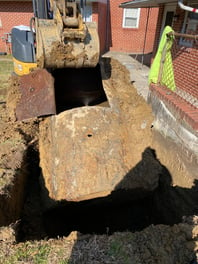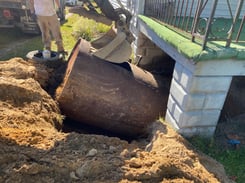Homeowners, Sellers, and Buyers seem to have oil tank removal issues.
Curren receives calls from people after their tank is removed that may or may not have an environmental issue and Curren sees this in both NJ, DE & PA.
Where’s the Tank Removal Report
 Homeowners with old underground oil tanks need to remove these tanks before they leak, well hopefully. When looking for tank removal companies, homeowners should receive a tank removal contract that provides costs and tank removal reports. Many removal companies provide no written tank removal report included for the tank removal work performed. Clearly, tank owners should and want their tank removal documented. The documentation of the tank removal can be passed on to a buyer when it is time to sell the property. The most important statement of an oil tank removal is “the tank didn’t leak”. The written report should provide documentation on the tank removal soil samples and explain how the tank removal company determined the tank leaked or did not leak. If the tank leaked, the tank removal report should explain what was seen, and the determination of the oil tank leak. Examples would include
Homeowners with old underground oil tanks need to remove these tanks before they leak, well hopefully. When looking for tank removal companies, homeowners should receive a tank removal contract that provides costs and tank removal reports. Many removal companies provide no written tank removal report included for the tank removal work performed. Clearly, tank owners should and want their tank removal documented. The documentation of the tank removal can be passed on to a buyer when it is time to sell the property. The most important statement of an oil tank removal is “the tank didn’t leak”. The written report should provide documentation on the tank removal soil samples and explain how the tank removal company determined the tank leaked or did not leak. If the tank leaked, the tank removal report should explain what was seen, and the determination of the oil tank leak. Examples would include
- Were there two pin holes in the tank?
- Were there no holes in the tank but the soils had evidence of an oil impact?
- What did you see when you removed the tank?
At Curren, we find homeowners don’t get a tank removal report regardless of if the tank did or did not leak. Of course, if you read the tank removal contract you can clearly see no report is referenced, but people don't know a tank removal report should be expected once the tank is removed and soil sample tests have been received.
 Another problem is that tank removal companies do not prepare tank removal clients regarding the “what if the tank leaked”. We often hear from people who had their tank removed and it leaked. The conversation before a tank is removed pertaining to the “What If” scenario of a tank leak is, “we can address a tank leak when it happens”. Here at Curren, we see every tank removal could be a leaking tank removal so the potential downside should be discussed with the tank owner in preparation for a tank leak and what soil remediation involves.
Another problem is that tank removal companies do not prepare tank removal clients regarding the “what if the tank leaked”. We often hear from people who had their tank removed and it leaked. The conversation before a tank is removed pertaining to the “What If” scenario of a tank leak is, “we can address a tank leak when it happens”. Here at Curren, we see every tank removal could be a leaking tank removal so the potential downside should be discussed with the tank owner in preparation for a tank leak and what soil remediation involves.
Companies are removing tanks and not taking any soil samples and most notably, not including soil sampling in the tank removal cost. When tanks leaks and samples are not acquired (certainly not the 5 to 6 samples you would want if a tank leaked to evaluate if remediation is warranted), the tank owner is informed that remediation is required. The less scrupulous companies that remove tanks want remediation, even when they don't know 100% that remediation is warranted. By not including soil samples many tank removal companies provide a very low-cost tank removal and quickly flip the client a quote for remediation, when often remediation is not warranted and, in many cases, lacks any qualitative data that’s oil levels are above standards. We see this in all three states all the time. You can't tell someone's cholesterol level by just looking at them, right? Bloodwork is needed to know the levels of cholesterol and what types of medication are warranted.

Underground Oil tank removals require permitting in the state of NJ. People do not understand that when a permit is required, the permit is for the tank removal alone, no environmental testing is required to pass inspection. Tank leaks and soil contamination are not a construction matter, which means the permit does not cover that part of the tank removal process, that part is environmental. Some inspectors might not even get out of their vehicles if they see the removed tank aboveground. Other inspectors will be more thorough and ask if holes were found in the tank, which if present will be referenced on the permit of either approval or fail, some inspectors fail tanks if holes are found in the tank. The tank failing inspection complicates matters even more because the permit's objective was achieved, which was the tank removal. There are times when the inspectors fail the tank because holes were seen, but the soil samples come back days later and are clean.
 The tank removal company will make the inspector look like the bad person in the project for failing a removed tank that has holes. The permitted task of removal was achieved, the tank was removed from underground. This leads the tank removal company to push for the need for remediation. Inspectors want to make sure an observed tank leak is documented, and they typically request to be supplied with the tank leak incident number. This all leads to the tank owner thinking the local inspector failed their tank removal due to the leak when the bad news of a tank leak falls on the tank removal company. If the company is licensed, they are familiar with the environmental regulations.
The tank removal company will make the inspector look like the bad person in the project for failing a removed tank that has holes. The permitted task of removal was achieved, the tank was removed from underground. This leads the tank removal company to push for the need for remediation. Inspectors want to make sure an observed tank leak is documented, and they typically request to be supplied with the tank leak incident number. This all leads to the tank owner thinking the local inspector failed their tank removal due to the leak when the bad news of a tank leak falls on the tank removal company. If the company is licensed, they are familiar with the environmental regulations.

